Sucker Punch (2011)
/(spoilers ahead)
Sucker Punch is probably one of the weirdest movie I’ve seen in a long time both for its content but also for its awfully conflicted message. It’s a Zack Snyder movie, so you know you’re up for something but even with this knowledge you should be in for a surprise. He does weird stuff with all his comic adaptations, which can be okay (Watchmen), pretentiously stupid (300) or infuriating (Man of Steel). And yes, Dawn of the Dead was pretty good, I’ll grant him that. But working without source material, Sucker Punch is just insanely crazy and not necessarily in a good way. It’s almost impossible to judge it simply as a movie because it has no real plot and no characters that go beyond cardboards (or sex dolls or action figures, depending on your point of view). It’s all visuals with some weird themes woven into it. It’s a mess, to be sure, and the more you think about it, the less it has any redeeming qualities.
People have criticized this movie for being sexist or, to quote Feminist Frequency, “a steaming pile of sexist crap.” But Snyder himself says it’s “a critique on sexist geek culture”, explaining that “dorky sci-fi kids” who watch the film should realize that they are the “men in the dark” who, in the movie, exploit women. So, again, slowly. The women in the movie are shown to be exploited by men so that we can ask ourselves if we enjoy this exploitation. But couldn’t that be difficult to pull off without actually exploiting the women? Snyder: “You can say what you want about the movie, but I did not shoot the girls in an exploitative way. They might be dressed sexually, but I didn’t shoot the movie to exploit their sexuality. There’s no close-ups of cleavage, or stuff like that. I really wanted it to be up to the viewer to feel those feelings or not. Does that make sense?” It would make sense if it were true and if his statement wouldn’t be a total cop-out.
But let’s take a closer look at the movie first because I think it’s a movie worth analyzing, only in different way than Looper or 12 Years a Slave. We can then come back to Snyder’s statements.
The movie opens on a stage (probably homaging Brecht) to make clear: “This is fiction.” The first lines are:
Everyone has an angel. A guardian who watches over us. We can’t now what form they’ll take. One day, old man. Next day, little girl. But don’t let appearances fool us. They can be as fierce as any dragon. Yet they are not here to fight our battles, but to whisper from our heart, reminding that it’s us. It’s everyone of us that holds the power over the worlds we create.
There clearly are more meta-messages here, even if I’d say this is a really badly written opening. What does it tell us? That we shouldn’t just look at appearances and we control the worlds we create? But if he is talking about his movies, we as the audience have no control over what he does. We can question what we see and look for a deeper meaning, but it’s his meaning, not ours. I find that opening more pretentious than profound.
We then are thrown into the story of Babydoll (Emily Browning), whose stepfather wants to rape her, she injures him, he in revenge tries to rape her sister, whom she then accidentally kills when trying to help her. All of this takes about two minutes and features Browning in a pyjama, wet, pigtails and all, already playing into typical male fantasies. She then enters the world of a mental institution, a world in which men play by their own rules and view the women patients as worthless. They want to lobotomize her, to erase her identity because they are the male oppressors, depicted so evil it borders on caricature. There is one female doctor (Carla Gugino) who believes she can save the girls by allowing them to build their own fantasy worlds, through which they are able to escape their traumas. Does this sound good? Because even if it does, it feels quite weird in its execution. But at this point we have no idea what will happen there and when we get to the point where Babydoll is almost lobotomized with an ice pick (“Phallic symbol, phallic symbol.”), we jump into the first level of a fantasy world.
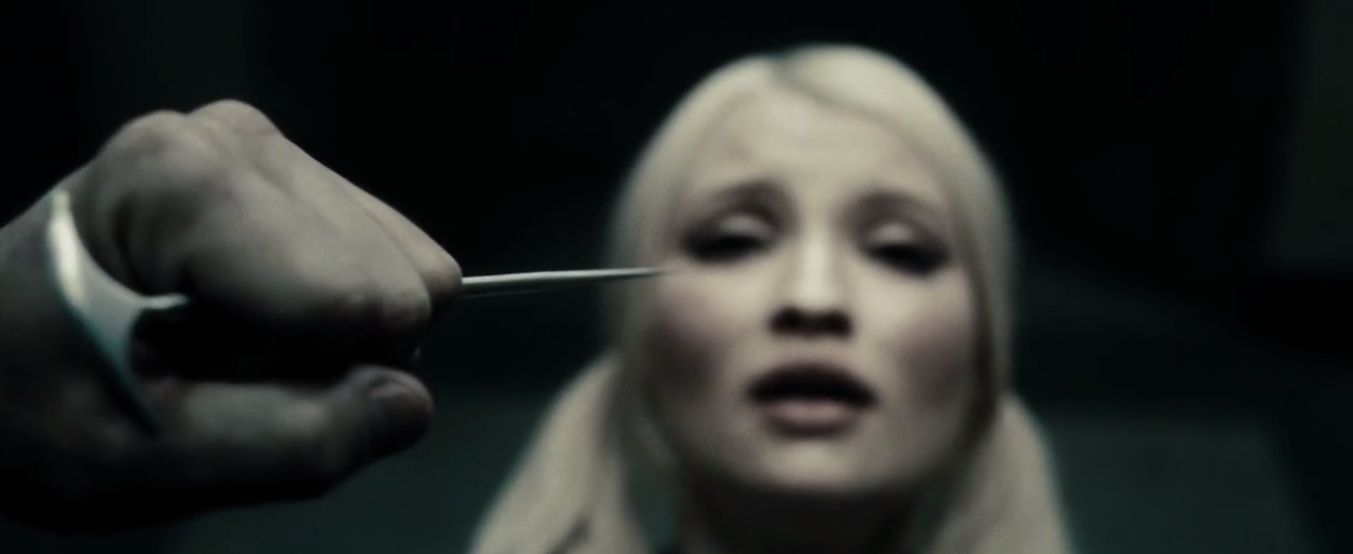
Are we supposed to believe that Babydoll escapes her lobotomy by going to this fantasy world? I don’t see any other interpretation. This fantasy world is a brothel, in which women have to dance for men. This is the fantasy world she escapes to? The men are even sleazier and caricatury than in “reality” and, yes, she has some power over them – by dancing so sexy and “titillating” that they can just stare. Which is a strange power, but not something I would file under “female empowerment.” When the “girls” of the “club” (maybe Air Quote would have been a better title than Sucker Punch) talk to each other, it sounds like what men imagine girls talk like.
Amber: I don’t think she’s a problem. She looked nice.
Blondie: She looks stuck up to me.
Amber: No, she’s scared. I feel sorry for her.
Blondie: Amber, you feel sorry for everyone.
They practice dancing to be the best dancer because the best dancer gets picked up by a client to have sex with them. So, why would they want to be good dancers? Rocket (Jena Malone) is fed up with the fat, disgusting, fat and disgusting cook, so he tries to rape her. But Babydoll saves her with, I think, her first spoken words in the movie (after 20 minutes of nothing but her big, babydoll, pin-up eyes): “Let her go, pig.” Because, you know, men are pigs. Especially the fat and disgusting ones. Not like the pretty girls who run around in skirts and lingerie.
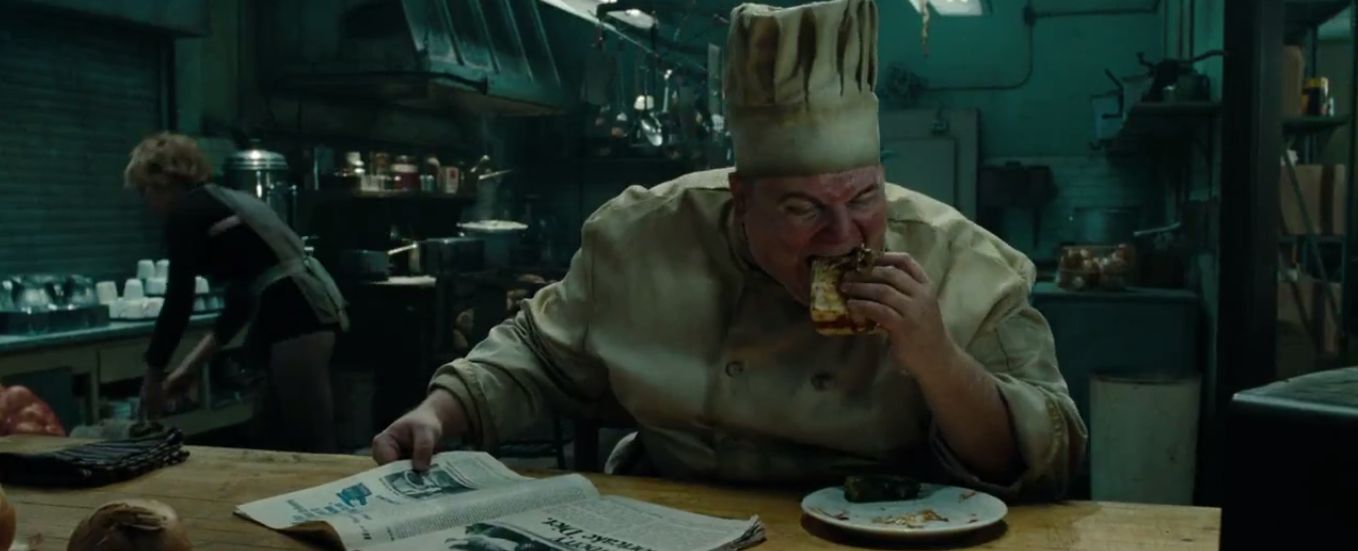
But then there’s the first dance sequence of Babydoll dancing. The gimmick of her dance is that we never actually see it, although I’m not sure why. To titillate the fanboys because they want to see this extremely sexy dance? Anyway, before it starts, the camera zooms in on her eyes like a lobotomy ice pick and we are in the next fantasy level. What follows here and in the next two installments is always the same. Babydoll and the other girls fight some monsters, samurai, dragon, Nazis, robots with all kinds of weapons and all kinds of vehicles. It’s obviously an attempt to recreate a video game feeling, but what is the bigger intention here? Because there is really nothing else but girls fighting bad guys in sexy outfits. Any attempt (even failed ones) at breaking stereotypes or playing with them is missing here. And “Look at these sexy girls fight, but if this arouses you, you’re sick.” doesn’t really work. It’s odd. The other thing about those scenes is that the girls fight and fight, but not without a man (Scott Glenn, which is kind of embarrassing for him) telling them exactly what to do first. I think this fact alone makes the whole supposedly female empowerment approach ridiculous. Again, I see the idea, showing strong women who can fight anything, but they can only do it in their fantasies and only with clear instructions by a male authority.
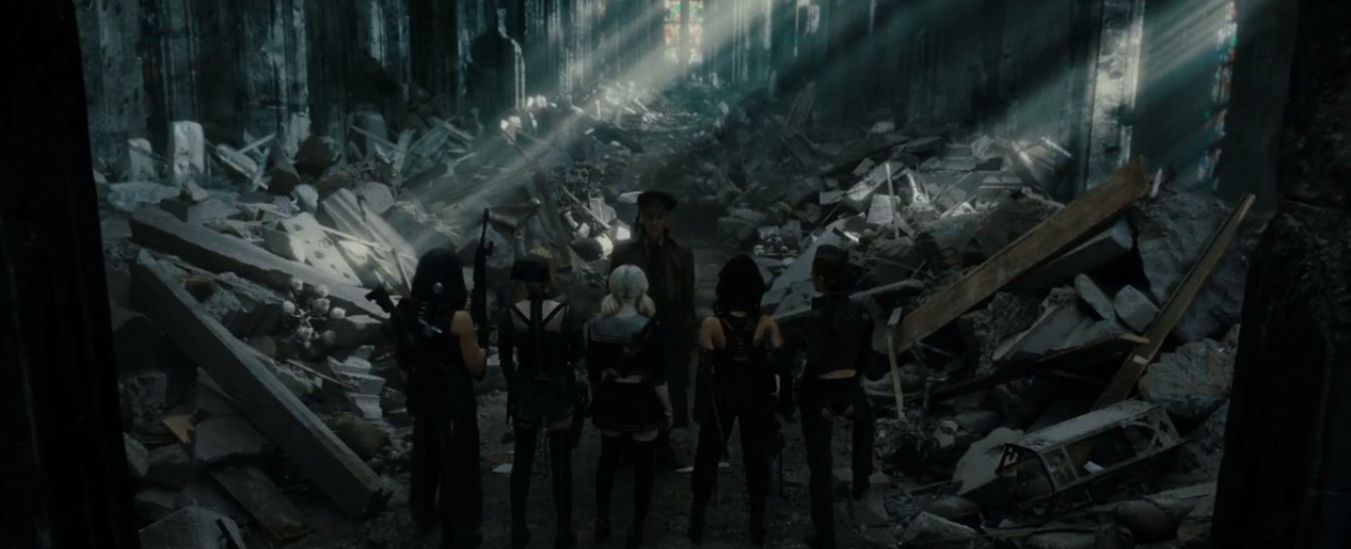
In between those action/video game/music video segments, the girls plan their escape. What is their main weapon to fool their male prison guards? Sex of course. Some have sex with men to get the ridiculous items they need and Babydoll always dances her invisible sexy dance to distract everyone. Unfortunately, the men are more clever than them and discover their plan pretty quickly, so that even the idea of the girls using their intellect doesn’t really come through. When Blue Jones (Oscar Isaac) threatens them because he finds out about their plan, their group quickly falls apart. Blondie runs to Madame Gorski (Carla Gugino again) and she in turn rats them out to Blue Jones. Female solidarity? Nope. But they are all pretty naïve, hm? You know how girls are. You want more stereotypes? The girls eventually do escape by fighting back (a little stab in the arm is enough) and then we see the last two remaining girls running through the brothel, crying, scared, seemingly helpless. Sweet Pea (Abbie Cornish) finally sacrifices herself, by giving herself over to men, so that Babydoll can escape. What’s the message here? Remember, we’re in the escapist fantasy of a girl about to be lobotomized. Maybe the message is that women are so oppressed by males that even in their fantasies they can’t escape them. Not a bad message, but not one the movie makes explicit.
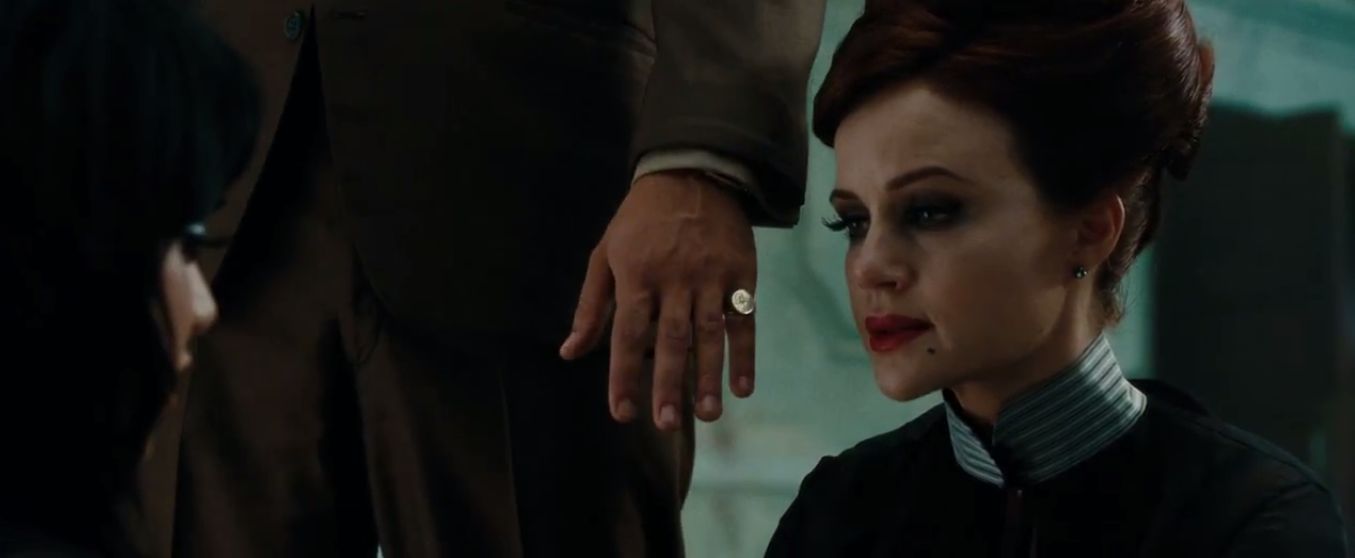
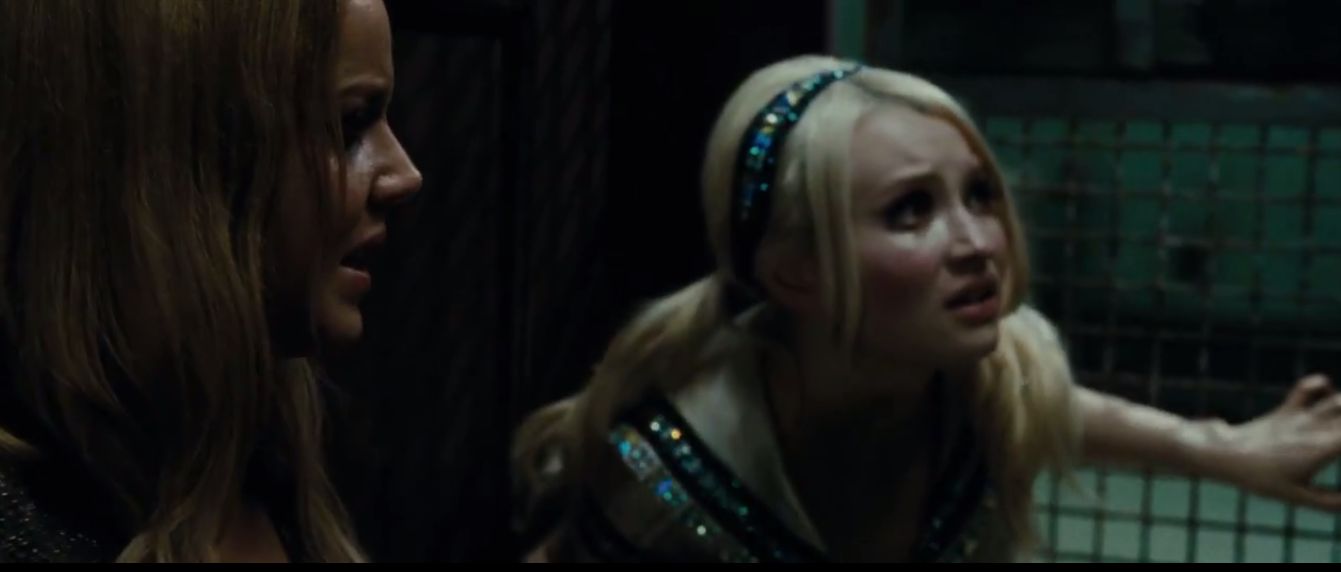
The movie ends… man, how this movie ends. We come back to the “real” world where Babydoll is lobotomized now and then the real-world Blue Jones tries to rape her but is arrested and she starts another fantasy in which Sweet Pea is at a bus station. Two police men try to stop her but a bus driver (Scott Glenn) saves her. The end. Well, not quite. Because the end credits feature all the girls doing sexy brothel burlesque dances. In the second to last credit moment Blue Jones is about to make a dance move that clearly represents sex with Sweet Pea (I think). The last moment has someone singing that “the drug is love.” Love? This is one of the most emotionless movies I’ve ever seen (succeeded by Man of Steel) and certainly there is no love to be found.
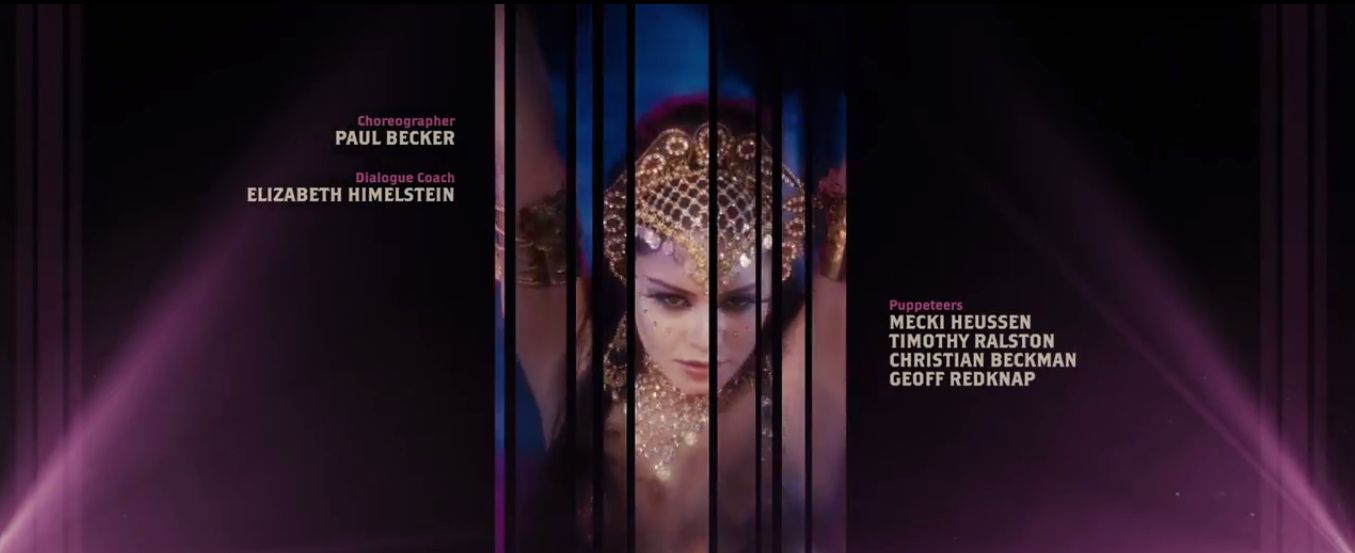
And finally, let's think back of Snyder's words: sexual, but not exploitative. Here we go:
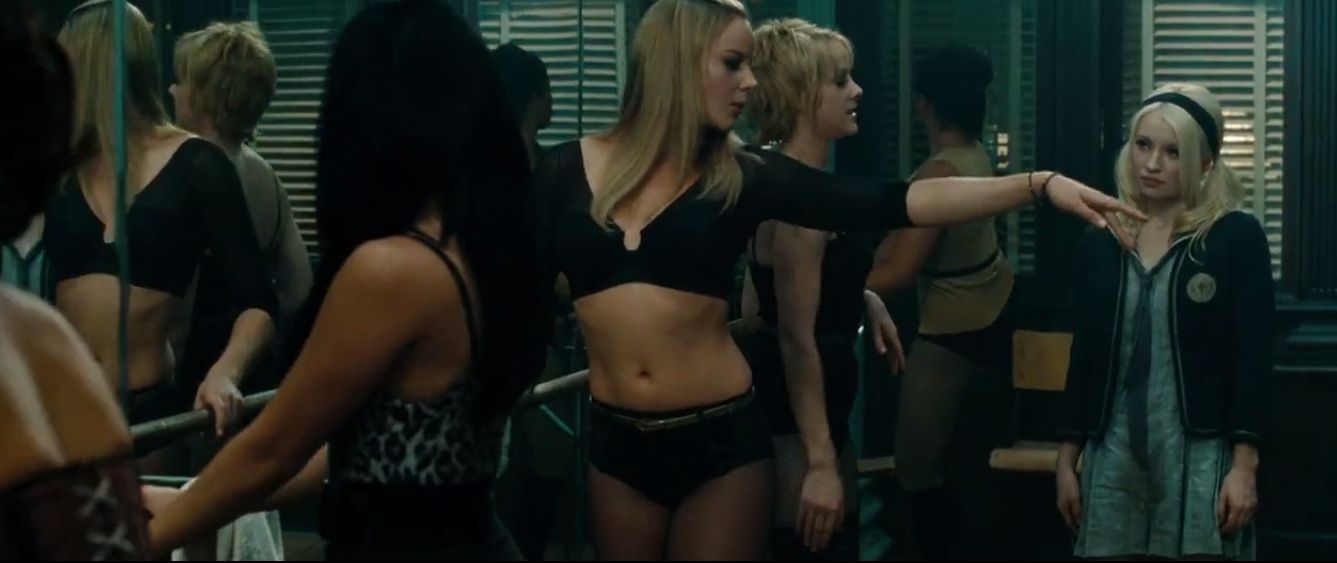
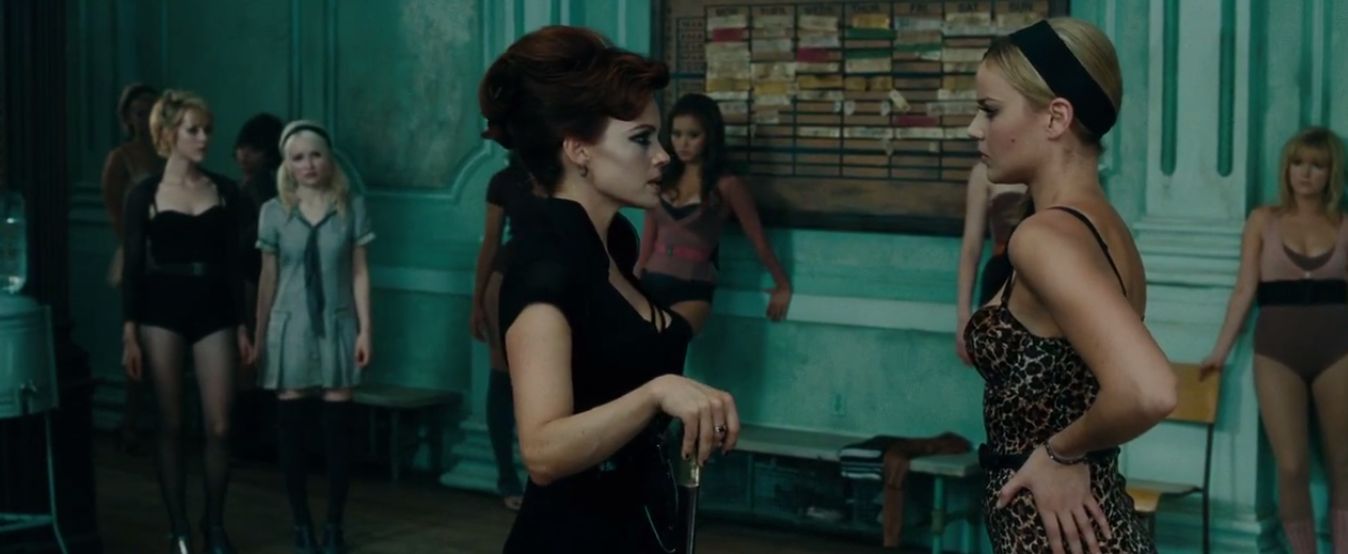

It's up for you to decide. I could have included more awkward shots you see while their fighting half-naked, but I found it too embarrassing.
This movie is stupid, it’s sexist and worst of all it pretends to be the opposite. But its message is muddled and conflicted, although saying that gives it almost too much credit. It reinforces female stereotypes, the importance of male authority and makes women’s fantasies look like they want to be sex slaves. I don’t think horny fanboys will be disappointed by this movie, because it looks like it was made by one.

